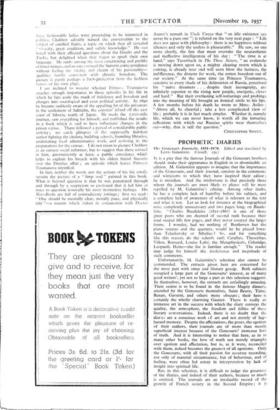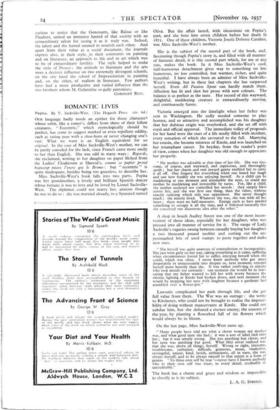PROPHETIC DIARIES
IT is a pity that the famous Journals of the Goncourt brothers should make their appearance in English in so abominable an edition. M. Galantiere appears to imagine that the importance of the Goncourts, and their journal, consists in the comments and witticisms to which they have inspired their editor ; he is mistaken. And the misfortune is that precisely those whom the journals are most likely to please will be most repelled by M. Galantiere's editing. Among other faults, he has a complete lack of humility before his subject, and a complete lack of awareness of what is relevant to the text and what is not. Let us look for instance at the biographical note, completely unnecessary and two pages long, on Baude- lairc. " Charles Baudelaire (1821-1867) is one of those great poets who are deemed of second rank because their total output fills few pages, and they never essayed the larger forms. I wonder, had we nothing of Beethoven but the piano sonatas and the quartets, would he be placed lower than Tchaikovsky or Sibelius ? So, and for something like this reason, do the schools rank Catullus, Theocritus, Villon, Ronsard, Louise Labe, the Metaphysicals, Coleridge, Leopardi, Heine—the list is familiar enough." The reader may judge for himself the irrelevance and ineptitude of such comments.
Unfortunately, M. Galantiere's selection also cannot be commended. The extracts given here are concerned for the most part with smut and literary gossip. Both subjects occupied a large part of the Goncourts' interest, as of many good writers', yet not so large a part as this selection suggests. In themselves, however, the extracts are unfailingly amusing. Their centre is to be found in the famous Magny dinners, attended by the Goncourts themselves, Saint Beuve, Taine, Renan, Gavarni, and others more obscure ; their hero is certainly the wholly charming Gautier. There is really an immense art in the success with which the diary conveys the qUality, the atmosphere, the freedom and follies of these literary conversations. Indeed, there is no doubt that the diaries are a conscious work c f art and not merely of hap- hazard memory. Despite the affectations, the poses, the egotism of their authors, their journals are of more than merely superficial interest because of the Goncourts' immense love of truth. And it is interesting to notice that here, as in so many other books, the love of truth not merely triumphs over egotism and affectation, but is, as it were, reconciled with them, indeed becomes the greatest of all egotisms. Only the Goncourts, with all their passion for accurate recording, not only of material circumstance, but of behaviour, and of feeling, were often led astray in interpretation by lack of insight into spiritual life.
But, in this selection, it is difficult to judge the greatness of the diaries, and indeed of their authors, because so much is omitted. The journals are an invaluable record of the growth of French society in the Second Empire ; it is
curious to notice that the Goncourts, like l3alzac or like Flaubert, united an immense hatred of that society with an extraordinary talent for seeing it as it truly was. Indeed, the talent and the hatred seemed to nourish each other. And apart from their value as a social document, the journals express also, in their style, in their comments on painting and on literature, an approach to life and to art which was to be of extraordinary fertility. The style helped to make the style of 'Proust ; the attitude to literature and the arts were a decisive influence on two extremely divergent schools, on the one hand the school of Impressionism in painting and, on the other, of realism in literature. Few authors have had a more productive and varied influence than the two brothers whom M. Galantiere so gaily patronises.
GORONWY REES.

















































































































 Previous page
Previous page